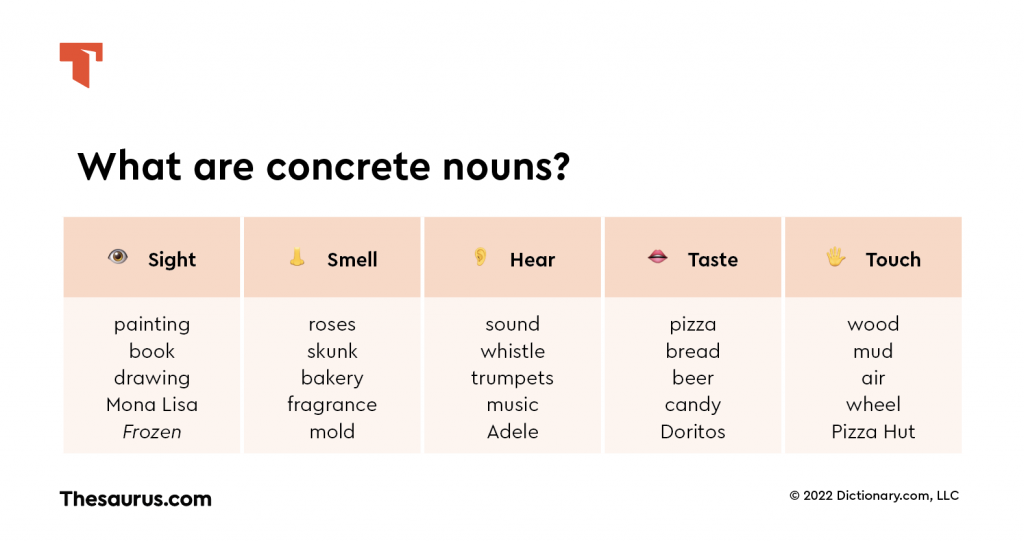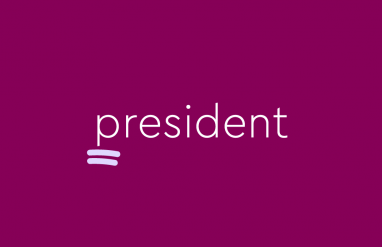Take a moment to think about what you did yesterday. Did you talk to a friend? Did you eat breakfast? Did you leave your house? There is something that all of the words for the people, places, and things around you have in common: they are all nouns.
In grammar, we use different types of nouns to refer to the many and varied people, places, and things we interact with during our lives. Today, we will investigate a particular type of noun that describes the simpler things in life: the concrete noun.
What is a concrete noun?
A concrete noun is “a noun denoting something material and nonabstract.” Here, concrete denotes the noun represents “an actual substance or thing, as opposed to an abstract quality.”
Putting it another way, concrete nouns refer to the things we can experience with our five senses. If you can see, smell, hear, taste, or touch something, that thing is referred to with a concrete noun. And if you recall your grade-school science lessons, you also know that our senses perceive these things because they are matter. The words refer to “physical or corporeal substances,” whether solid, liquid, or gaseous. For example, you can see smoke. You can smell a flower. You can hear a whistle. You can taste bananas. You can touch a ladder. All of these words are concrete nouns. While concrete is useful in the construction of buildings, concrete nouns help us build strong grammar and explain the world around us.
Concrete noun examples
Many, many words are concrete nouns. We use them to describe everything we can see and many things that we can’t. Concrete nouns can be singular nouns or plural nouns. Concrete nouns can be common nouns or proper nouns. Concrete nouns can be collective nouns, countable nouns, or uncountable nouns. You will see how versatile concrete nouns can be as we explore examples.
Living things
If something is alive, it can be observed and perceived. Even extremely small living things like bacteria and amoebas can be seen with a microscope. We use a lot of different concrete nouns to refer to all of the people, animals, plants, and other creatures that share our world:
- People: man, women, children, friend, people, Benjamin Franklin, Pocahontas, Spider-Man
- Animals: dogs, cat, bird, fish, Tony the Tiger, Smokey the Bear, Hello Kitty
- Plants: tree, grass, moss, rose, tulip, bush, garden, crops, weeds
- Others: mushroom, mold, fungi, bacteria, cells, protozoa
Places
You can experience places with your senses, so we also refer to them with concrete nouns. We use concrete nouns to refer to both general and specific places.
- city, outside, neighborhoods, parks, mountain, Atlanta, Shanghai, Norway, South America
Things
Many, many things are referred to with concrete nouns. Remember, the thing must be material and tangible for it to be considered a concrete noun—it can’t be abstract, like an idea, a kind of noun we will turn our attention to next.
Let’s look at many examples of concrete nouns that are used to refer to things. As you read these words, think about which of your senses you would use to experience each item.
- apple, blizzard, cloth, doorknob, elbows, fortress, glass, hot dog, igloo, jackhammer, kennel, litter, money, nitrogen, octagon, pumpkins, quilt, rain, snow, television, underwear, volcano, wagon, xylophone, yardstick, zippers
List of concrete nouns
Let’s review our understanding of concrete nouns by listing examples. We’ll assign each word to each of the five senses as a way to help clarify these concepts, but you could easily use more than one of your senses to experience many of the things on this list.
👁️ Sight: painting, artwork, book, show, performance, movie, television, drawing, note, letter, document, the Mona Lisa, The Lord of the Rings, The Powerpuff Girls, Frozen
👃 Smell: cheese, roses, skunk, perfume, bakery, fragrance, odors, mold, coffee
👄 Taste: pizza, bread, food, desserts, candy, beer, milk, Fruity Pebbles, Doritos, Earl Grey tea
👂 Hear: sound, sirens, whistle, ring, trumpets, banjo, chime, music, Dr. Dre, Billie Eilish
✋ Touch: wood, paper, computer, coins, mud, plastics, sand, trash, wheel, Wal-Mart, Pizza Hut, Nintendo Switch, iPhone, the Eiffel Tower, Barbados, air, fire, wind
The difference between concrete & abstract nouns
You should have a good idea of what a concrete noun is by now. To review, concrete nouns refer to all of the people, places, and things that we can experience with the five senses.
Now, what about a noun that can’t be observed in this way? It would be called an abstract noun. Abstract nouns refer to things that exist but are intangible or exist as ideas or concepts rather than physical, material objects. For example, the words sadness, chaos, and history are abstract nouns—though we very much emotionally, psychologically, and socially experience them. You can’t see, touch, smell, taste, or hear any of these things. You can see a person who is feeling doubt and you can describe examples of chaos, but these things don’t exist as tangible objects. While you can imagine a singular concrete manifestation of an apple or a chair, you cannot do that with a noun like doubt. And you certainly can’t hold chaos in your hands!
As is often the case in grammar, things can become tricky when it comes to certain words that could be considered either a concrete or abstract noun. The word school, for example, is used both to refer to a building for teaching children (concrete noun) and a word to generally refer to the concept of an organized education system (abstract noun). Be careful of nouns like these, and use context to help you determine if a noun with multiple senses is being used as a concrete noun or abstract noun.
If you think you understand the difference between concrete and abstract nouns, test yourself with the following sentences. Each one contains an example of a concrete noun and an abstract noun:
- We went to the baseball game and watched Rebecca display her incredible athleticism.
- When it comes to heroism, nobody is better than Batman.
- Wealth cannot buy happiness.
- This diploma proves I have a good education.
- Life is easier if you have lots of friends.
All the nouns, none of the errors
You’ll never mistake a concrete and abstract noun again when you check your writing on Thesaurus.com’s Grammar Coach™. This writing tool uses machine learning technology uniquely designed to catch grammar and spelling errors. Its Synonym Swap will find the best nouns, adjectives, and more to help say what you really mean, guiding you toward clearer, stronger, writing.
Whether you’re writing about a person, place, or thing, perfect grammar has never been easier!















